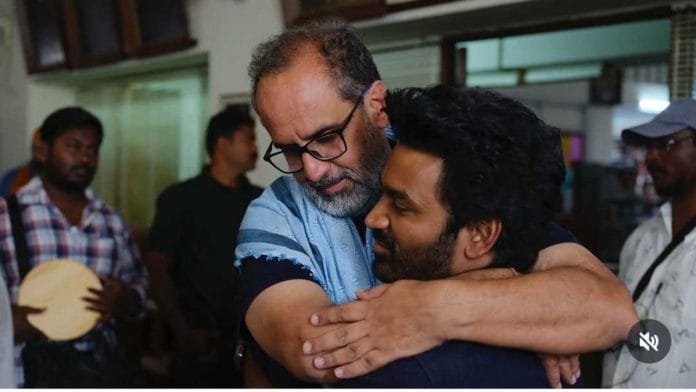New Delhi: The Tamil version of the 2013 romantic drama Raanjhanaa, starring Dhanush and Sonam Kapoor, is re-releasing in theatres today with a new AI-assisted happy ending. Filmmaker Aanand L Rai has distanced himself from the project.
“If Raanjhanaa meant something to you, as it did to us, please know that this AI-altered version does not reflect who we were. Nor does it carry the spirit of the film we made,” he wrote, in an Instagram post.
While the production house Eros International remains firm in its stance, filmmakers warn that if AI keeps advancing at this rate, the “joy of filmmaking” could soon disappear, and many can lose their livelihood.
“On one hand, it is creatively fascinating, but on another, it is quite concerning,” filmmaker Samit Kakkad, known for projects like Aayna Ka Bayna (2012) and Half Ticket (2016), told ThePrint.
“It’s intriguing to see how technology enables people to reimagine familiar narratives, but the same without the filmmaker’s intent undermines the original vision. As filmmakers, our films are about emotions, context, and choices we make; for that to be altered without consent is concerning,” he said.
Kakkad notes that creative freedom isn’t just about expression anymore; it’s about protection too. He demands stronger conversations and frameworks around digital rights, authorship, and ethical use of creative material.
“I don’t have an issue with the use of the technology, but to not have the creator in confidence or seek approval on building on someone’s vision is a problem. Where does this start and stop?” the filmmaker said.
Aanand Rai vs Eros controversy
When Eros announced the re-release of Raanjhanaa with a new happy ending, it didn’t go down well with the filmmaker. According to Aanand L Rai, the AI-edited changes are a betrayal of the team’s work and legacy.
“The idea that our work can be taken and modified by a machine, then dressed up as innovation, is deeply disrespectful. To cloak a film’s emotional legacy in a synthetic cape without consent is not a creative act. It’s an abject betrayal of everything we built. I’m speaking for everyone who helped bring this film to life. The writer, actors, composer, lyricist, technicians, and larger crew. None of us were consulted. None of us were heard,” he wrote.
He called the AI-altered version of Raanjhanaa “unauthorised” and a reckless takeover that strips the work of its intent, its context, and its soul.
The production house announced that the film will now include a new climax. Eros said that it holds complete rights to the film and is within its legal bounds to alter it. Using AI, according to the production house, is simply a way to embrace evolving technology.
“This is a creative reimagining, not a replacement, and is consistent with global industry practices, including anniversary editions, alternate cuts, and modernised remasters,” the Group CEO of Eros Media World Group, Pradeep Dwivedi, told PTI.
“We categorically reject Mr Rai’s allegations, which are not only factually incorrect but also legally unfounded. The re-release is a respectful reinterpretation and not a ‘tampering’ of the original. It is clearly positioned as an alternate, AI-enhanced version akin to classic cuts or re-edits seen globally,” he added.
Also read: AI regulation gets trickier with Grok. India needs adaptive, not reactionary policies
Where is the industry headed?
Kakkad calls ‘AI in films’ an uncharted territory. While he admits that AI will become a part of the filmmaking process and it already has to a considerable extent, it must remain a tool, not a replacement.
“Human stories need human storytellers. If the industry allows cost-cutting or convenience to outweigh creativity and authenticity, yes, certain roles could be at risk,” he said.
Upcoming film Match Fixing’s director Kedar Gaekwad shares a similar perspective.
He talked about how his generation of filmmakers has witnessed several major shifts—from chip cameras to the rise of OTT platforms, and their surpassing traditional theatres. The next big disruption appears to be Artificial Intelligence.
“In the late 90s and early 2000s, there was immense respect for cameramen and technicians because mastering the craft took years of hands-on experience,” he said. “Around 2008-2009, talks began about the transition to digital cameras. By 2012, Kodak had filed for bankruptcy, and by 2015, the industry had completely moved to digital. That transition was both frightening and overwhelming. While no one lost their jobs then, AI might change that.”
According to him, while filmmakers’ creativity might get compromised, technicians and writers are at a higher risk of losing their jobs.
Gaekwad mentioned a conversation with a friend in the US who predicted in 2016 that people would eventually stop going to theatres and instead turn their homes into mini cinemas.
“At the time, I dismissed the idea as far-fetched. But then Covid-19 hit, and that shift became real. We still haven’t fully returned to theatres. It was another huge transformation and one that’s continuing to affect the film industry, especially with the dominance of OTT platforms.”
He also shared a recent experience where he needed a writer for a short script for an audiovisual platform.
“I just gave a few prompts and key ideas, and AI generated the script. So, we have no choice but to adapt to the changing times and technologies, because no one can predict what’s coming next,” he added.
However, film critic Ramesh Bala said that the Raanjhanaa incident should be a lesson for filmmakers.
“Going ahead, filmmakers should ensure that they add a clause in the agreement that states creative changes using AI shouldn’t be made without the filmmaker’s approval,” Bala said.
Bala refuses to watch the AI-generated Raanjhanaa. In his view, the film can only cater to a very niche audience: “Dhanush fans who were probably five or six years old in 2013, and weren’t allowed to watch the film back then.”
(Edited by Ratan Priya)






